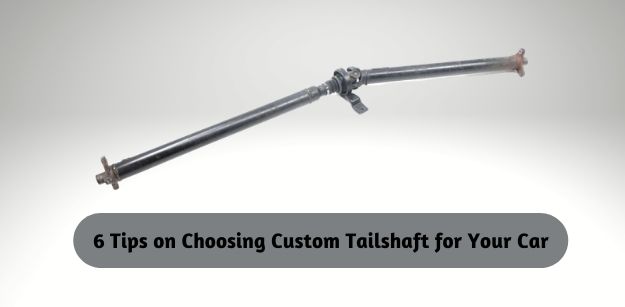If you have experienced strange noises or shuddering from the rear of your car, then it is quite possibly the vehicle’s tailshaft.
The transmission is an essential part of all vehicles, the tailshaft is the mechanism which drives the rear wheels and is made up of different moving parts which co-ordinate the movement, balance and power to move the rear wheels.
If you need more from your vehicle other than standard driving, you may be looking at getting a Custom Tailshaft made and fitted to expand its capacity.

If you are planning on going 4 wheel driving, Dune driving or Drag Racing, then you will need a custom tailshaft to withstand the rigors of the different terrains. These activities put considerable pressure on your vehicle, so the mechanics and equipment need to be up to the job. Here are 6 tips on choosing a Custom Tailshaft for your car.
1. Your Knowledge
Choosing a Custom tailshaft for your car, requires specialist knowledge and equipment, however your knowledge and experience of the procedure will be of great benefit.
If you don’t have a working knowledge of custom tailshafts, do some research and find out as much as you can before looking for your mechanic to do the job. The better informed you are about the requirements for your vehicle, the better you are able to know if your mechanic is the right person for the work.
2. What will your vehicle be used for?
Custom tailshafts are made for specialist use to ensure that the vehicle has the power and maneuverability for its intended job.
When you speak to your mechanic, it is important that you provide comprehensive information about what the vehicle is going to be used for and the type of conditions it will encounter.
Are you going to use the vehicle for 4-wheel driving, Rock Climbing, Sand-hopping or Drag Racing? Each of these activities has particular conditions for your vehicle to negotiate; your mechanic needs to have this information to make the correct custom tailshaft for the vehicle’s use.
3. Research for the right mechanic
Look for reputable workshops that specialize in this work, then check their credentials and how long they have been in business.
Word of mouth is a great way to find the right mechanic to make a custom tailshaft…particularly if the recommendation comes from a trustworthy source, such as in a recreational club or group whose vehicles have the same requirements as yours.
Check the websites of the workshops that you find, and read all of the reviews, including any independent reviews that you may come across.
4. Visit the Workshop before making a Booking
A mechanic who can undertake all aspects of your vehicle’s maintenance at a high quality and with the correct equipment is what you ideally want.
Visit the workshop and ask questions, and note whether they are asking you questions regarding your vehicle’s use. Custom tailshafts require experienced mechanics and specialist equipment tailored for the purpose, so you want to ensure that the mechanic and the workshop is up to the job.
Visiting the workshop and talking to the mechanic tells you whether they have a professional approach and know what they are doing. You can also see if they have the correct parts and equipment for your needs.
Select a mechanic that you will be happy to go back to for any adjustments or repairs. If you find a reputable, reliable and honest mechanic, you can build an ongoing relationship knowing that you can trust their work, who knows your vehicle.
5. Warrantees and Guarantees
Make sure that your chosen workshop is accredited and complies with Industry Standards such as the Australian Institute of Automotive Mechanical Engineers (AIAME).
Establish that your mechanic can provide you with a guarantee for their work, and warrantees on all parts. Check that their work is meets Industry Standards, and that their equipment up to date and in excellent working order. A reputable mechanic will be happy to provide a written quote for work undertaken along with a guarantee for work done.
6. Comprehensive discussion
In order to get the best work from you mechanic, it is important that they are fully informed about what your vehicle’s driving conditions will be.
You need a good working knowledge of your car and its uses to inform the mechanic about the best way to approach the work.
Apart from knowing the activity that you intend to undertake, your mechanic needs to know if there have been any modifications or changes that have been, or will be, made to your vehicle other than those by the manufacturer.
This gives your mechanic a full picture so that work can be done with any modifications in mind when making the tailshaft.